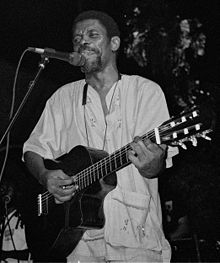- Manno Charlemagne
-
Manno (Emmanuel) Charlemagne, born 1948, is a Haitian political folk singer, songwriter and acoustic guitarist, lifelong political activist and former politician. He recorded his political chansons in both French and in Creole. He lived abroad in exile twice, both during the 1980s and again during the years 1991-1994, when the country was ruled by a military junta led by Raoul Cédras. In 1995, Charlemagne was elected mayor of Port-au-Prince after running as an independent candidate, while Oganizadyon Politik Lavalas (OPL), J.B. Aristide's political party at the time, did not present a mayoral candidate for Port-Au-Prince, many considered this decision by OPL as a sign that Aristide had supported Manno's candidacy. He was mayor until 1999.
Contents
Life
Born in 1948, Charlemagne grew up in the sprawling new suburb of Carrefour, to the south of the capital, where he was influenced as much by the songs of the peasants who moved into the area in search of a livelihood, as by his Catholic school choir. In the 1970s, he was part of the kilti libete or freedom culture movement that promoted popular culture, including acoustic, folk music. Charlemagne's writing drew on the twoubadou tradition, a guitar-based music that can trace its roots back both to the rural songs of the Haitian peasantry and to the Cuban influences brought back to Haiti by returning migrant sugar cane cutters in the early decades of the twentieth century.
The Jean-Claude Duvalier regime renewed the repression of political and cultural dissent in 1980, and Charlemagne was forced into exile. With the fall of the Duvaliers in 1986, he returned home, and was active in both political organising and the burgeoning roots or racines music scene. He formed a live group, Koral Konbit Kafou, which included drummers from a Voudou temple, and played concerts that provided a soundtrack for the popular mobilisation for political change in the late 1980s. Some of these songs can be heard on "Nou Nan Male ak Oganizasyon Mondyal", Kako Productions, 1988.
His support for the grassroots, popular movement frequently landed him in trouble with the Haitian military, and, after receiving death threats, he spent several years in semi-clandestinity. Charlemagne was a supporter of the Lavalas political movement of President Jean-Bertrand Aristide against whom the military launched a brutal coup d'état in September 1991. Charlemagne took refuge in the Argentine embassy and went into exile once again. During 1991-94, he played concerts in Miami, New York, and Montreal, where he rallied the expatriate Haitian communities in support of Haitian democracy. He released a recording, "La Fimen", Kako Productions, in 1994.
Following the United Nations intervention to restore the constitutional government in September 1994, Charlemagne returned to Haiti. In June 1995 he was elected mayor of the capital city, Port-au-Prince, defeating the incumbent, Evans Paul, but his term of office, which expired in early 1999, was beset with difficulties and controversy, and is not regarded as a success. His administrative responsibilities overshadowed his musical career, and one of his few public performances during that time was with the Haitian-American rap group, The Fugees, in Port-au-Prince in April 1997.
Music
As a singer, songwriter and political activist, Manno Charlemagne has been the vocal conscience of Haiti for over 30 years. A soulful yet brazen balladeer, he constantly challenged the status quo and used his acoustic guitar and tender baritone voice as weapons against brutal political regimes and the civilized indifference of the insulated upper-class.
The CD Les Inedits de Manno Charlemagne in Creole language is some of his most profound and provocative work. They are songs that for years were only performed in intimate settings, among close friends, and in front of those who were unafraid of how incendiary they could be. For to have performed them in public during the 1970s or 80s would have risked a great deal--arrest, harassment, and beyond.
With their cunning lyrics, they are the songs that the powers that be in Haiti did not want the Haitian people to hear. Intended to stir up resistance and bring about much-needed change in the country, they spoke the truth about corrupt governments and ruthless politicians, gave voice to the peasant class in Haiti, and captured the rawness and injustice of life in this country.
Although they sound like love songs to the non-Creole speaker, they are songs of protest aimed at the tools of oppression. And it is their unique juxtaposition of thorny words poured over gentle melodies that makes them so hauntingly beautiful.
Manno Charlemagne also appears in The Truth About Charlie, a movie by Jonathan Demme, one of his friends.
References
- Averill, Gage (1997). A Day for the Hunter, a Day for the Prey : Popular Music and Power in Haiti. Chicago: University of Chicago Press. pp. 126–127 etc. ISBN 0-226-03292-2. http://books.google.com/books?id=gEPiQZ5n0L0C&pg=PA126&vq=manno+charlemagne&dq=%22Manno+Charlemagne%22&as_brr=3&output=html&source=gbs_search_s&cad=1.
- Gates, Henry Louis; Appiah, Anthony (1999). Africana: The Encyclopedia of the African and African American Experience. New York: Basic Civitas Books. p. 411. ISBN 0-465-00071-1. http://books.google.com/books?id=plr1k1pszMMC&pg=RA1-PA411&dq=%22Manno+Charlemagne%22&output=html.
External links
- Steven Almond (January 29, 1992). "Manno Charlemagne". Miami New Times. http://www.miaminewtimes.com/content/printVersion/233748. Retrieved 2008-11-04.
- Larry Rohter (October 17, 1995). "PORT-AU-PRINCE JOURNAL; Protest Singer Is Now Mayor, but Still Protesting". New York Times. http://query.nytimes.com/gst/fullpage.html?res=990CEFD7173FF934A25753C1A963958260.
- NPR Audio Report: Manno Charlemagne: The Bob Marley Of Haiti
- Manno Charlemagne Radio on mizikpam.com Manno Charlemagne Radio
Categories:- 1948 births
- Living people
- Haitian musicians
- Fanmi Lavalas politicians
- Mayors of Port-au-Prince
- Acoustic guitarists
Wikimedia Foundation. 2010.

